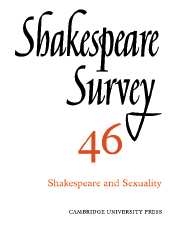Book contents
- Frontmatter
- Shakespeare and Sexuality
- As Who Liked It?
- Malvolio and the Eunuchs: Texts and Revels in Twelfth Night
- The Scandal of Shakespeare’s Sonnets
- Weaving and Writing in Othello
- ‘That’s She that was Myself’: Not-so-Famous Last Words and Some Ends of Othello
- ‘The Catastrophe is a Nuptial’: The Space of Masculine Desire in Othello, Cymbeline, and The Winter’s Tale
- Reconstructing The Winter’s Tale
- Late Shakespeare: Style and the Sexes
- The Virgin Not: Language and Sexuality in Shakespeare
- Fleshing his Will in the Spoil of her Honour: Desire, Misogyny, and the Perils of Chivalry
- Bowdler and Britannia: Shakespeare and the National Libido
- Shakespeare and the Ten Modes of Scepticism
- Shakespeare Performances in England, 1992
- Professional Shakespeare Productions in the British Isles, January-December 1991
- 1 Critical Studies
- 2 Shakespeare’s Life, Times, and Stage
- 3 Editions and Textual Studies
- Books Received
- Index
Shakespeare and the Ten Modes of Scepticism
Published online by Cambridge University Press: 28 March 2007
- Frontmatter
- Shakespeare and Sexuality
- As Who Liked It?
- Malvolio and the Eunuchs: Texts and Revels in Twelfth Night
- The Scandal of Shakespeare’s Sonnets
- Weaving and Writing in Othello
- ‘That’s She that was Myself’: Not-so-Famous Last Words and Some Ends of Othello
- ‘The Catastrophe is a Nuptial’: The Space of Masculine Desire in Othello, Cymbeline, and The Winter’s Tale
- Reconstructing The Winter’s Tale
- Late Shakespeare: Style and the Sexes
- The Virgin Not: Language and Sexuality in Shakespeare
- Fleshing his Will in the Spoil of her Honour: Desire, Misogyny, and the Perils of Chivalry
- Bowdler and Britannia: Shakespeare and the National Libido
- Shakespeare and the Ten Modes of Scepticism
- Shakespeare Performances in England, 1992
- Professional Shakespeare Productions in the British Isles, January-December 1991
- 1 Critical Studies
- 2 Shakespeare’s Life, Times, and Stage
- 3 Editions and Textual Studies
- Books Received
- Index
Summary
Shakespeare as a thinker is notoriously hard to pin down. One can use the critical pronouncements of Ben Jonson or John Milton to interpret their works with some confidence, but for Shakespeare such pronouncements are hard to come by, and equivalent ideas within the plays and poems are veiled in dramatic irony or else tantalizingly incomplete. One could argue, as Bernard Shaw does, that Shakespeare's ideas are conventional and trivial, not worth recovering, even that he is hopelessly confused about the abstractions of philosophical thought and perhaps not very much interested in them. However, that is not a position to be taken without at least considering alternatives.
One school of thought that was in part rediscovered in Shakespeare's day shares this ironic elusiveness and taint of anti-intellectualism in the eyes of its opponents: the radical scepticism associated with the name Pyrrho of Elis. This philosophy as set forth in the manuscripts of Sextus Empiricus inspired Montaigne and others to take very seriously the teachings of Pyrrhonism as a means of living through an age of doubt and controversy about basic issues of philosophy and religion. Irony comes naturally to the Pyrrhonist, who uses the tools of rational analysis to undermine the claims of reason. My aim is to demonstrate some striking parallels with Pyrrhonist thought in Shakespeare's plays and poems and then to speculate (with more boldness than sceptical restraint) on the significance of those parallels. This is to associate Shakespeare with scepticism as many critics have done, but in a more specific way, aiming at what is distinctively Pyrrhonist.
- Type
- Chapter
- Information
- Shakespeare Survey , pp. 145 - 158Publisher: Cambridge University PressPrint publication year: 1993

